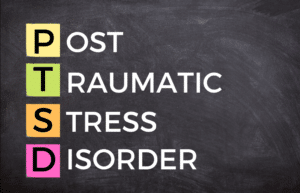 Post-traumatic Stress Disorder (PTSD) or experiencing a traumatic event, can make you feel alone or hopeless. You may also find it hard to function in day-to-day activities because your symptoms can appear without warning or apparent cause. Here’s some information about how to live with PTSD.
Post-traumatic Stress Disorder (PTSD) or experiencing a traumatic event, can make you feel alone or hopeless. You may also find it hard to function in day-to-day activities because your symptoms can appear without warning or apparent cause. Here’s some information about how to live with PTSD.
What is PTSD?
PTSD is a mental health condition rooted in your body’s response to a traumatic event. It causes intrusive symptoms, avoidance behaviors, arousal symptoms, and negative changes in cognition and mood, that persist for more than one month after the traumatic event. Symptoms include nightmares, intense anxiety, intrusive negative thoughts, being easily startled, feelings of guilt or shame about the event, and dissociative symptoms.
Treatment Options
Fortunately, if you struggle with PTSD you can still live a normal life.
Psychotherapy: Commonly referred to as talk therapy, this includes both individual and group therapy. Psychotherapy will give you a safe space to process the event with a trained trauma professional, help alter your cognitive beliefs about the event, identify your triggers, and develop a repertoire of coping skills to manage and reduce the intensity of your PTSD symptoms. Effective treatments include Cognitive-Behavior Therapy (CBT), Dialectical Behavior Therapy (DBT), Eye Movement Desensitization and Reprocessing (EMDR), and Exposure therapy. Additionally, group therapy will give you the opportunity to feel heard and understood by others who have also experienced a traumatic event.
Medication: If your PTSD symptoms are overwhelming it may be helpful to speak with a medical professional for medication to help alleviate the intensity of your symptoms and make it easier to function on a day-to-day basis. A combination of medication and psychotherapy is generally the most effective treatment for most mental health conditions.
Living with PTSD
As well as psychotherapy and medication, there are coping skills you can use to help reduce symptom intensity and improve your day-to-day life.
Lean On Your Support Systems: Research continues to show that support from loved ones is helpful in overcoming a mental health condition. We don’t necessarily need advice or guidance; sometimes we just need someone to listen to us, to cry to, or distract us from our emotional pain. Having a safe space to express yourself and your needs can help while working through the stressors of a traumatic event.
Mindfulness: The goal of mindfulness is to be present in each moment. Not to be living in the past or future, but living in the present. Mindfulness is about focusing on one task at a time, being aware of how you feel, and of your environment. You can practice mindfulness while engaging in day-to-day routine tasks such as driving, walking, cooking, or cleaning.
Meditation: Meditation includes mindfulness activities, guided imagery, deep breathing, and progressive muscle relaxation. It helps reduce negative emotions and stress. You can find free meditation scripts and videos on the internet. Schedule time each day for meditation. It will help you can manage the emotions and thoughts associated with PTSD stressors.
Exercise: Exercise has been shown to benefit your mental health by reducing tension and stress in the mind and body; as well as being helpful in reducing the severity of PTSD symptoms. Exercise does not need to be intense; it can be simply going for walks, doing yoga, and stretching.
Get A Therapy Dog: Therapy dogs have been proven to help people struggling with mental health conditions, particularly PTSD, through stress and anxiety..
Journaling: Journaling is a healthy and effective way to express your feelings and emotions, and is linked to improved mental health. It can be a safe way to release negative emotions about traumatic events.
Avoid Drugs and Alcohol: Drugs and alcohol alter your brain chemistry and hormones and will worsen your symptoms, making it harder to cope with PTSD
Distraction Skills: Our brain can only focus on one thing at a time. If you distract your brain from negative emotions, those emotions will reduce in intensity and become easier to manage.
Self-soothe: Self-soothing is a coping skill that uses activities that calm your five senses. This can reduce the severity of your negative emotions and help you cope with them.
Show Yourself Compassion: You just experienced a traumatic event and trauma has been proven to change brain chemistry. Trauma modifies your brain structure. You should try to treat yourself the same way you’d treat a loved one going through a traumatic event. Most importantly, remember that emotions are fleeting, and all the emotions you feel will pass eventually. Be patient with, and kind to, yourself as you learn to cope with the symptoms of PTSD.
Contact us today to schedule a complimentary 15-minute phone consultation or to book an appointment.

